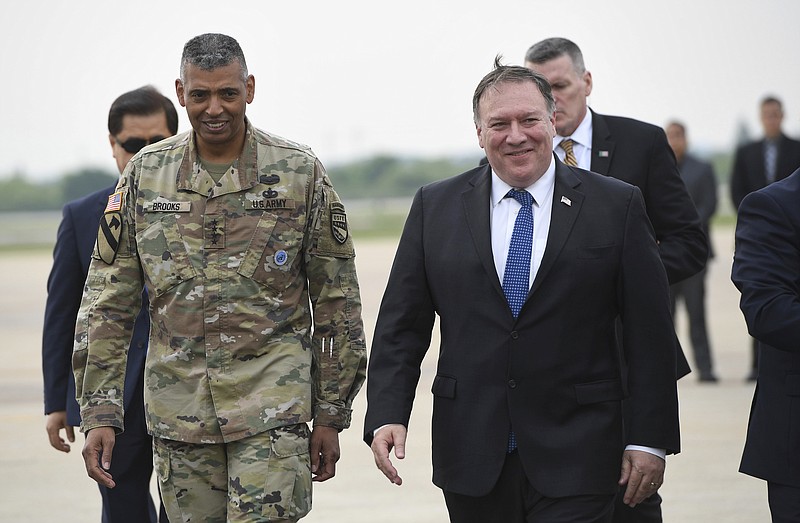WASHINGTON (AP) - America and the world can "sleep well tonight," President Donald Trump declared Wednesday, boasting his summit with Kim Jong Un had ended any nuclear threat from North Korea though the meeting produced no details on how or when weapons might be eliminated or even reduced.
While Trump claimed a historic breakthrough at the most significant diplomatic event of his presidency, Secretary of State Mike Pompeo, was more measured. He said the U.S. wants North Korea to take "major" nuclear disarmament steps within the next two years - before the end of Trump's first term in 2021.
Pompeo also cautioned the U.S. would resume "war games" with close ally South Korea if the North stops negotiating in good faith. The president had announced a halt in the drills after his meeting with Kim on Tuesday, a concession long sought by Pyongyang.
The summit in Singapore did mark a reduction in tensions - a sea change from last fall, when North Korea was conducting nuclear and missile tests and Trump and Kim were trading threats and insults that stoked fears of war. Kim is now promising to work toward a denuclearized Korean Peninsula.
But the details of what is sure to be a complex and contentious process have yet to be settled.
Despite the uncertainties, Trump talked up the outcome of what was the first meeting between a U.S. and North Korean leader in six decades of hostility. The Korean War ended in 1953 without a peace treaty, leaving the two sides in a technical state of war.
"Just landed - a long trip, but everybody can now feel much safer than the day I took office," Trump tweeted early Wednesday. "There is no longer a Nuclear Threat from North Korea. Meeting with Kim Jong Un was an interesting and very positive experience. North Korea has great potential for the future!"
Pompeo, who flew to Seoul after the summit, said the brief, four-point joint statement that emerged from the summit did not encapsulate all the progress the U.S. and North Korea had made. He said negotiations would recommence "in the next week or so."
He bristled at questions from reporters about the vague wording of the statement where North Korea "commits to work toward complete denuclearization of the Korean Peninsula" - a promise it has made several times before in the past 25 years and reneged on. Pompeo said Kim understands that "there will be in-depth verification" in any deal with the U.S.
"We have big teams ready to go," including experts from the U.S. and other partners around the world, Pompeo said. "We're prepared to execute this once we're in a position that we can actually get to a place where we can do it."
On Thursday, the rival Koreas held rare high-level military talks to discuss reducing tensions across their heavily fortified border. It's possible North Korean officials will seek a firm commitment from the South on stopping its military drills with the United States.
Seoul's Defense Ministry said the talks would focus on carrying out agreements from a summit between Kim and South Korean President Moon Jae-in where they vowed to take materialized steps to reduce military tensions and eliminate the danger of war.
It was left to Pompeo, who has twice visited Pyongang, to explain the summit's outcome to anxious U.S. treaty allies South Korea and Japan. In the South Korean capital, Pompeo and the foreign ministers from both countries joined for a three-way meeting, ignoring a shouted question from a journalist about concerns over the halt in military exercises.
In public, at least, South Korea's leader sought to put a positive spin on the summit's outcome. Meeting briefly with Pompeo on Thursday morning, Moon said he was eager to hear how the United States and North Korea could "fully and expeditiously implement this great agreement" in the coming days.
"The summit was a truly historic feat which moved us from the era of hostility towards the era of dialogue, of peace and prosperity," Moon said through a translator
Pompeo, the former CIA director, planned to fly to Beijing later Thursday to update the Chinese government about the talks.

